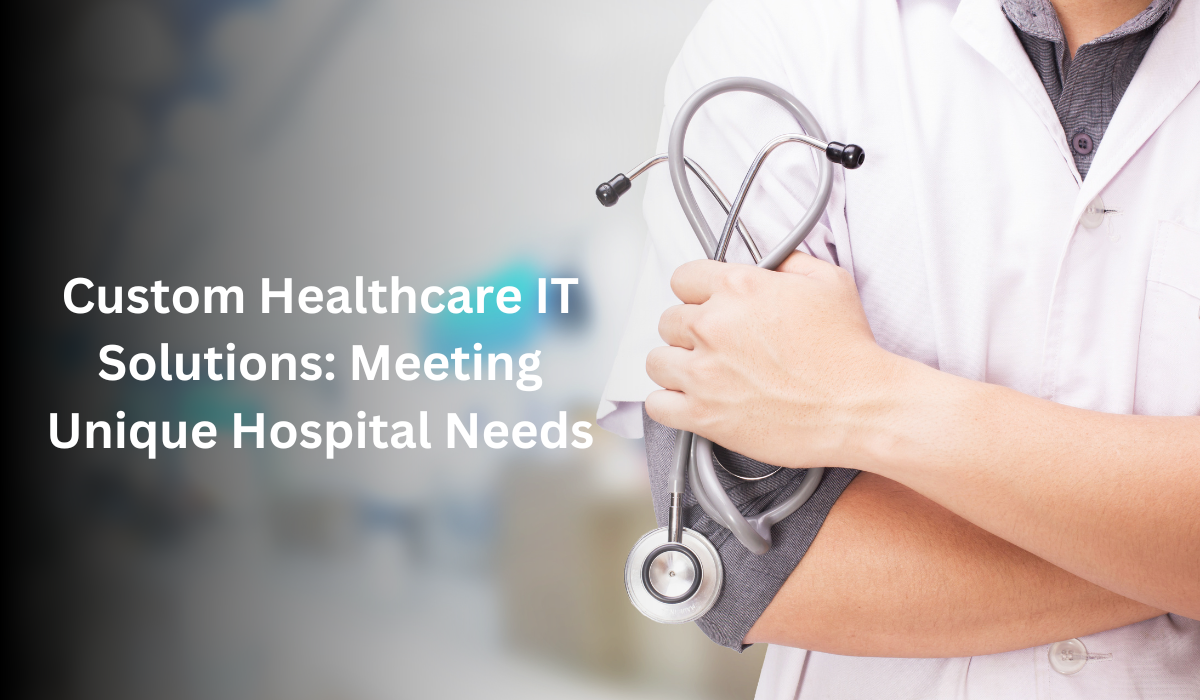
Healthcare is an industry where innovation and technology play pivotal roles in improving patient outcomes and operational efficiency. With hospitals facing an array of unique challenges, off-the-shelf software solutions often fail to address specific requirements. This is where custom healthcare IT solutions come into play. These solutions are designed to align with a hospital’s distinct workflows, regulatory requirements, and patient care objectives.
In this article, we’ll explore why IT solutions for healthcare are essential, the benefits of custom development, and how tailored solutions meet the evolving needs of hospitals in a tech-driven era.
The Need for Custom Healthcare IT Solutions
Healthcare providers and hospitals work in extremely complex situations. Their issues, which range from maintaining electronic health records (EHRs) to guaranteeing adherence to data protection regulations, call for flexible and dependable IT systems. Generic software, however, frequently lacks the adaptability to meet particular hospital requirements, which can result in errors, inefficiencies, and lost growth possibilities.
Unique Hospital Challenges
- Complex Workflows: Hospitals often manage diverse workflows across departments like emergency care, diagnostics, and administration.
- Regulatory Compliance: Hospitals must adhere to stringent regulations, such as HIPAA, GDPR, and local healthcare laws.
- Scalability: As hospitals expand, their IT systems must scale seamlessly to accommodate growth.
- Data Interoperability: Integrating data from multiple sources, such as labs, imaging centers, and wearable devices, is vital but challenging.
Custom IT solutions address these challenges by offering tailored functionality and integration capabilities, setting hospitals up for long-term success.
Key Benefits of Custom IT Solutions for Healthcare
1. Enhanced Operational Efficiency
Custom IT systems streamline hospital workflows by automating repetitive tasks, such as patient admissions, billing, and appointment scheduling. This frees up staff to focus on patient care rather than administrative burdens.
For instance, a tailored EHR system can reduce the time doctors spend on documentation by integrating voice recognition or template-driven input methods.
2. Improved Patient Care
When healthcare IT solutions are designed to fit a hospital’s unique needs, they can greatly enhance patient care. Features like real-time patient monitoring, telemedicine capabilities, and predictive analytics help doctors make informed decisions quickly.
A custom solution might integrate wearable technology data into the hospital's system, enabling proactive care for patients with chronic conditions.
3. Data Security and Compliance
Custom solutions ensure that hospitals meet their specific compliance needs. For example, a custom-built system can include advanced encryption protocols, automated audit logs, and role-based access controls to protect sensitive patient information.
Hospitals also benefit from systems that are updated regularly to adapt to changing regulations.
4. Better Data Management
Hospitals generate enormous volumes of data daily. Custom solutions allow seamless integration of data from various departments, enabling healthcare providers to derive actionable insights. This data can be used to improve clinical outcomes, optimize resource allocation, and even predict patient admission trends.
5. Scalability and Future-Readiness
Custom healthcare IT solutions can grow with a hospital. Whether expanding to new locations, adding services, or adopting new technologies, a bespoke system is easier to modify and scale than a generic one.
How Custom Healthcare IT Solutions Meet Unique Needs?
1. Tailored EHR and EMR Systems
EHR and EMR systems are the backbone of hospital IT infrastructure. Custom solutions ensure that these systems align perfectly with hospital workflows, offering features like department-specific templates, seamless integration with medical devices, and advanced reporting tools.
2. Telemedicine Integration
With the rise of telemedicine, hospitals need robust platforms for virtual consultations. Custom IT solutions for healthcare allow for seamless integration of telehealth services, enabling secure video calls, digital prescriptions, and remote monitoring within the hospital's existing IT ecosystem.
3. Advanced Analytics
Predictive analytics is transforming patient care by identifying high-risk patients and recommending preventive interventions. Custom healthcare IT solutions can incorporate machine learning algorithms tailored to a hospital's unique patient demographics and care patterns.
4. Real-Time Communication Tools
Efficient communication between doctors, nurses, and administrative staff is critical in a hospital setting. Custom IT solutions can include HIPAA-compliant messaging platforms, patient portal integrations, and real-time alert systems to enhance coordination.
5. Patient Portals
Custom-built patient portals empower patients by providing access to their medical records, test results, and appointment schedules. These portals can also include personalized health tips, medication reminders, and billing information.
Steps to Develop Custom Healthcare IT Solutions
1. Understanding Hospital Needs
The development process begins with a thorough needs assessment. IT consultants collaborate with hospital staff to identify pain points, inefficiencies, and goals.
2. Choosing the Right Development Partner
Partnering with an experienced healthcare IT solutions provider is crucial. They bring expertise in compliance, security, and industry best practices.
3. Designing the Solution
This phase involves creating user-friendly interfaces and workflows tailored to hospital staff and patients. Prototypes and mockups are tested for feedback.
4. Development and Testing
The custom solution is developed with a focus on scalability, security, and performance. Rigorous testing ensures that it meets all functional and compliance requirements.
5. Deployment and Training
Once deployed, staff training ensures smooth adoption. Ongoing support and maintenance keep the system running efficiently.
Conclusion
As hospitals navigate the challenges of 2024, investing in custom healthcare IT solutions is no longer optional—it’s a strategic necessity. These solutions enable providers to streamline operations, enhance patient care, and stay ahead in an increasingly competitive landscape.
Whether you’re a small clinic or a large hospital, partnering with an experienced IT healthcare solutions provider ensures that your system is designed to meet your unique needs while remaining scalable and secure. By embracing bespoke technology, hospitals can deliver better care, improve efficiency, and build a future-ready foundation.